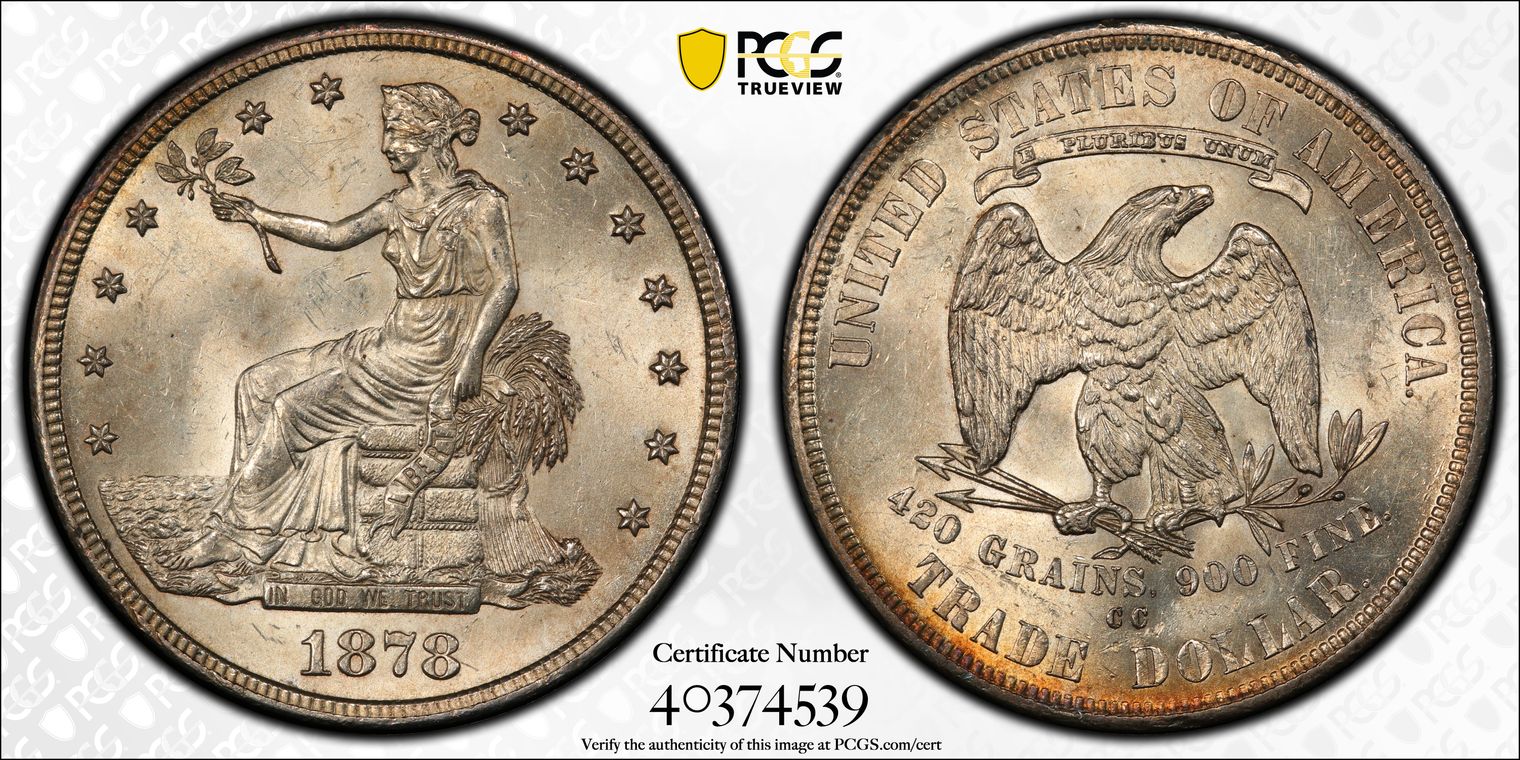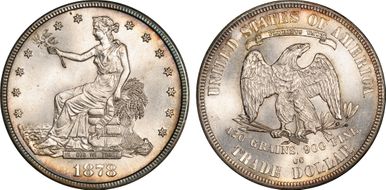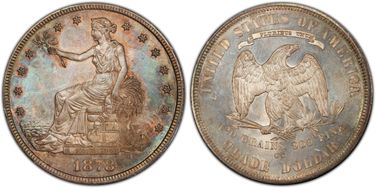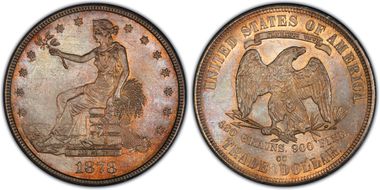1878-CC T$1 Trade MS63 认证号40374539, PCGS号7047
专家评论
Jack Beymer
I have handled more 1794 dollars than I have 1878-CC Trade dollars.David Hall
This is an incredibly underrated coin in all grades. Long time coin dealer Jack Beymer, who has handled as many key dates coins as anyone, says he has handled more 1794 dollars than 1878-CC trade dollars. That's an incredible statement and shows how truly rare this coin is in any grade.Q. David Bowers
The following narrative, with minor editing, is from my "Silver Dollars & Trade Dollars of the United States: A Complete Encyclopedia" (Wolfeboro, NH: Bowers and Merena Galleries, Inc., 1993):Coinage Context
Made rare by decree. Secretary of the Treasury John Sherman, who disliked trade dollars intensely (even though the director of the Mint, Dr. Henry Linderman, believed they were an excellent, useful coin), mandated on February 22, 1878, that no trade dollars would be raid out for deposits of bullion made prior to the order for discontinuance when received at Carson City.
When this order reached Carson City, this branch mint had already struck 97,000 pieces; 56,000 in January and 41,000 in February-the smallest circulation strike quantity of the denomination. Thus, a rarity was created.
Melting: On July 19, 1878, 44,148 undistributed trade dollars went to the melting pot. All must have been dated 1878-CC, many from the 41,000 delivered in February.(It has been suggested that some in the melt (popularly believed to be fewer than 10,000) may have been of the 1877-CC issue. However, as R.W. Julian has noted, "There is no support for the claim that some of these were dated 1877. Coins were paid out as struck and, under normal circumstances, only coins of 1878 would have been available for melting in July. " Letter to the author, August 22, 1992.)
This leaves a net mintage for distribution of only 52,852 coins.
Numismatic Information
A prime rarity: By all accounts the 1878-CC is the most popular rarity among circulation strike trade dollars. Other coins (such as 1873-CC and 1876-CC) may be rarer in the highest Mint State levels of MS-64 and finer, but it is 1878-CC that gets the most publicity. The reason, of course, is its mintage figure, which is by far the lowest in the series. Indeed, especially in Mint State a beautiful 1878-CC is an object of admiration and desire. Relatively few exist at this grade level.
Circulated grades: In grades from VF-20 to AU-58 the 1878-CC is the rarest and most desirable circulation strike trade dollar issue. I have never seen even a small group of these, and this includes in inspections of bulk lots imported from the Orient. Douglas Cass has reported than in his extensive search for trade dollars in the Orient in the early 1980s, 1878-CCs were virtually non-existent,(Per conversation between the author and Douglass Cass, August 26, 1992.) Most circulated coins of this issue are in higher grade levels such as EF and AU. It seems likely that for some reason most of the 1878-CC mintage remained in the United States. In America, they certainly did not circulate hand to hand as legal tender; perhaps they were simply retained as bullion coins, with an intention (never fulfilled) to export, by one or more commercial interests.
Chopmarked coins: The theme continues with chop marked coins; the 1878-CC is the rarest chopmarked trade dollar. Concerning these, John M. Willem wrote the following:
It is extremely difficult to find an 1878-CC with a genuine Chinese chopmark, It is the author's considered opinion that a chopmarked 1878-CC is the rarest of the trade dollars in any condition. Of those of this date and mint which circulated in the United States most undoubtedly were among those redeemed and melted, since they were not defaced, during the redemption period in 1887.
Apparently, relatively few were sent to China, and most probably remained in the United States.
Mint State grades: In Mint State grades the 1878-CC is rare and highly desirable. The desire to own a Mint State coin of this issue is increased by the fame of the 1878-CC as the rarest of all Carson City trade dollars from a mintage viewpoint. However, in MS-65 there are six to 10 known, which does not rank it at the top of the list in rarity. (However, trade dollar specialist Andrew P. Harris, M.D., states that certain certification population reports of MS-64 1878-CC trade dollars may have been unduly influenced by the resubmission five times of a single coin. As such population reports form a part of my data, if this is true, the 1878-CC may be rarer in MS-64 than indicated. Letter to the author, dated August 27, 1992.) In fact, a whole string of circulation strike trade dollars are rarer at this level: 1873-S, 1875-CC, 1877, 1873-CC, 1874-CC, 1874-S, 1875-S/CC, 1876-CC, and 1877-CC. Although the order of such rarity ratings will undoubtedly change as years pass and new discoveries are made, still the 1878-CC probably will never rank as among the very rarest MS-65 trade dollars. However, it will probably remain among the most expensive, due to its reputation as an overall rare date.
In MS-64 grade perhaps 20 to 40 are known, and at the MS-63 level the population is probably on the order of 15 to 25. Here is an unusual distribution:
MS-63 coins are rarer than MS-64 pieces. At the MS-60 to 62 level, about. 20 to 40 are known-about the same rarity as MS-64. When a Mint State 1878-CC trade dollar is seen, it is just as apt to be in a middle to high Mint State level as in a low one. This is because the 1878-CC was struck late in the game, and coins did not see the extensive distribution or hard use in circulation accorded to earlier varieties in the series.
A 1980 commentary: In their 1980 study, Maurice Rosen and Robert Emmer found the 1878-CC to be the fourth rarest trade dollar in terms of Mint State examples. They examined six Mint State pieces and about 15 AU pieces, and reported that coins advertised were often overgraded.
Varieties:
OBVERSE TYPE II, RIBBON ENDS POINT DOWN, 1876-1885
REVERSE TYPE II: NO BERRY BELOW CLAW, 1875-1885
Circulation strikes.(A die-struck 1878-CC with Type I reverse was examined by John Lazirko (Lazirko, p. 39) and found to be a counterfeit weighing 382 grains; in addition, the E in E PLURIBUS UNUM was missing. Also see 1877-S Type II/I.)
1. Tall CC. Normal 8 and CC, first C low: Breen-5822. Mintmark 1.17 mm high; .35 mm spacing between C's. Rare. Die used to coin 1877-CC trade dollars.
2. Tall CC. Repunched 8 and CC: Breen-5823. Mintmark 1.17 mm high; .35 mm spacing between C's. Rare.
3. Repunched 8 with misplaced CC, far to right above DO: Breen-5824. Rare.
Dies prepared: Obverse: 2 or more; Reverse: 3 or more (including at least one held over from 1877)
Circulation strike mintage: 97,000 (44,148 melted; net mintage available for distribution: 52,852, probably all from the January mintage). Delivery figures by month: January: 56,000; February: 41,000.
Estimated quantity melted: Possibly nearly half (or even more) of the mintage, as part of 44,148 trade dollars melted at the Carson City Mint on July 19, 1878.
Characteristics of striking: Usually seen well struck and, in Mint State grades, with smooth, satiny lustre.
Known hoards of Mint State coins: None
Rarity with original Chinese chopmark(s): Rarest of all chop marked trade dollars.
Commentary
Very few were ever chopmarked; apparently, most remained in the United States. 1878-CC is considered by numismatists to be the key issue among circulation strike trade dollars. This is true except in grades of MS-64 and higher.
PCGS #
7047
设计师
William Barber
边缘
Reeded
直径
38.10 毫米
重量
27.20 克
铸币数量
97000
金属成分
90% Silver, 10% Copper
更高评级数量
11
评级较低的钱币数量
230
地区
The United States of America
价格指南
PCGS 数量报告
拍卖 - PCGS 评级的
拍卖 - NGC 评级的
稀有性和存量估计 了解更多
| 所有评级 | 350 |
| 60或以上 | 50 |
| 65或以上 | 3 |
| 所有评级 | R-6.3 |
| 60或以上 | R-8.5 |
| 65或以上 | R-9.8 |
| 所有评级 | 3 / 18 |
| 60或以上 | 2 / 18 TIE |
| 65或以上 | 5 / 18 TIE |
| 所有评级 | 3 / 18 |
| 60或以上 | 2 / 18 TIE |
| 65或以上 | 5 / 18 TIE |























